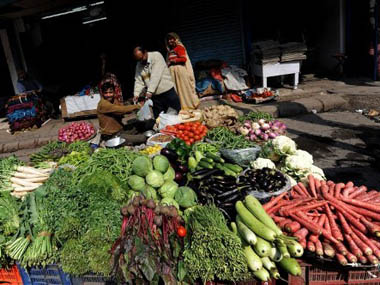Retail inflation declined to 5.91 percent in March over the previous month, mainly due to falling food prices as well as fuel rates, government data showed on Monday.
The retail inflation based on Consumer Price Index (CPI) was 6.58 percent in February 2020 and 2.86 per cent in March 2019. The inflation in the food basket was 8.76 percent in March 2020, lower from 10.81 percent in the previous month, as per the CPI data released by the National Statistical Office (NSO). [caption id=“attachment_1980749” align=“alignleft” width=“380”] Representational image. Reuters[/caption] The Reserve Bank of India (RBI) mainly factors in the retail inflation while deciding its bi-monthly monetary policy. The government has mandated the central bank to keep inflation at around 4 percent. Vegetables inflation for March stood at 18.63 percent against 31.61 percent in February while inflation rate in cereals and products stood at 5.30 percent for March against 5.23 percent a month ago. Pulses and products witnessed an inflation of 15.85 percent in March as against 16.61 percent in February. Prices of meat and fish slightly declined at 9.15 percent, against 10.2 percent a month ago. In the fuel and light category, inflation for March was seen at 6.59 percent against 6.36 percent in February. In the wake of the coronavirus pandemic, the RBI on 27 March cut the repo rate by 75 basis points to 4.40 percent versus 5.15 percent earlier. The monetary policy committee (MPC) advanced its meet to 24-27 March and voted by 4:2 majority to reduce the policy repo rate. On Monday, the RBI said that all-out efforts are needed to mitigate the adverse impact of the COVID-19 pandemic, and the RBI will use any instrument necessary to revive growth and preserve financial stability. The MPC, headed by RBI Governor Shaktikanta Das, was originally scheduled for 31 March, 1 and 3 April, 2020, but was advanced in view of the coronavirus pandemic. On the inflation front, Das said the outlook has changed drastically. The governor said the usual uptick that begins in summer months may remain subdued if demand conditions take longer to normalise. The weakening of domestic aggregate demand may also help to contain core inflation. As per the minutes of the MPC meet, released by the RBI, Das said the global macroeconomic situation has abruptly worsened in the last fortnight or so. –With inputs from agencies


)

)
)
)
)
)
)
)
)



